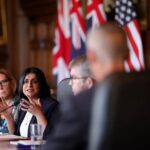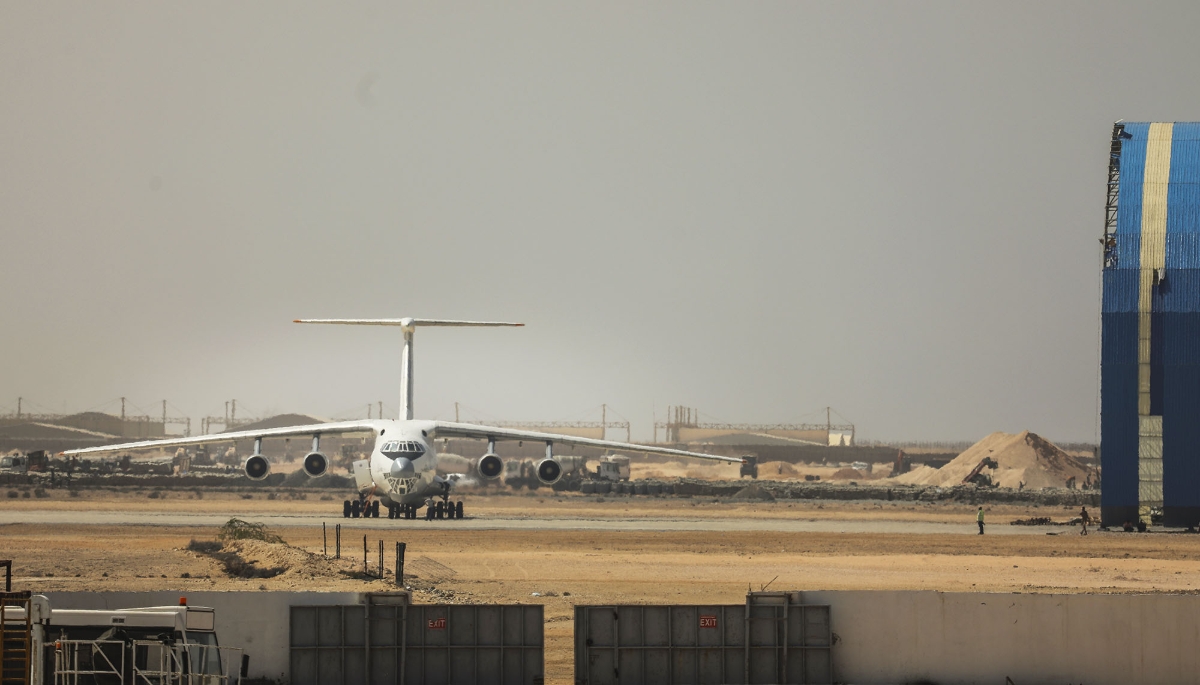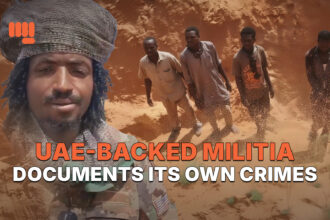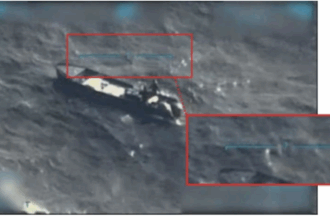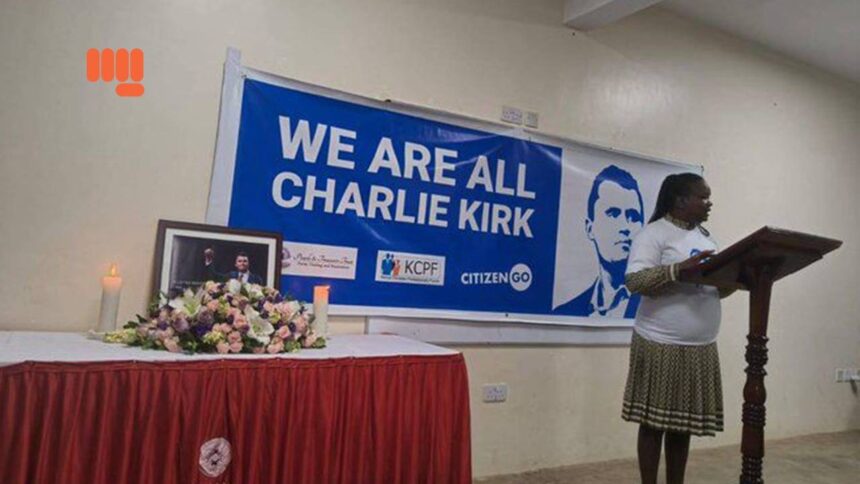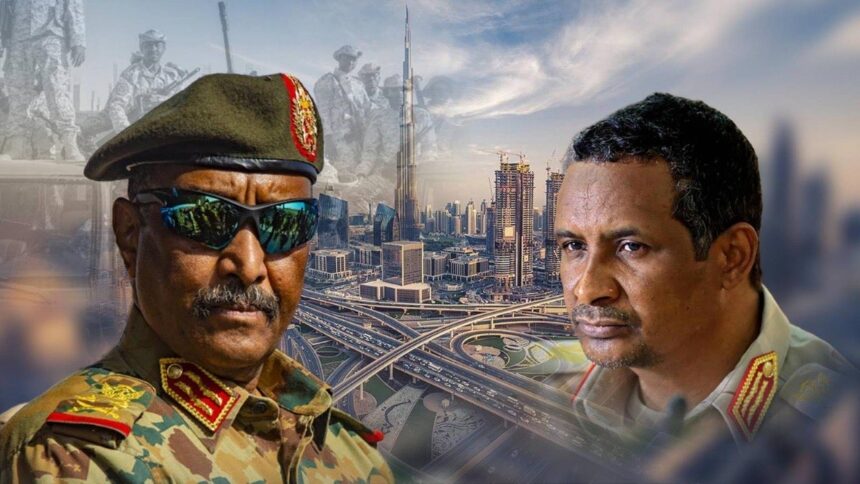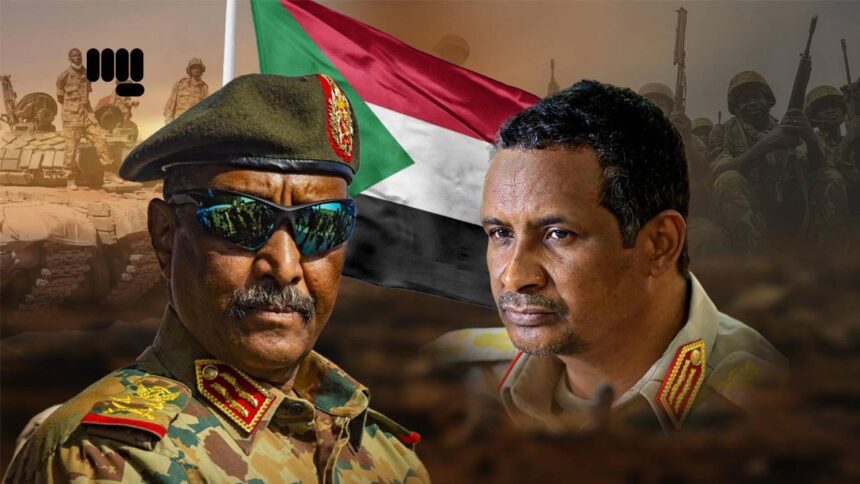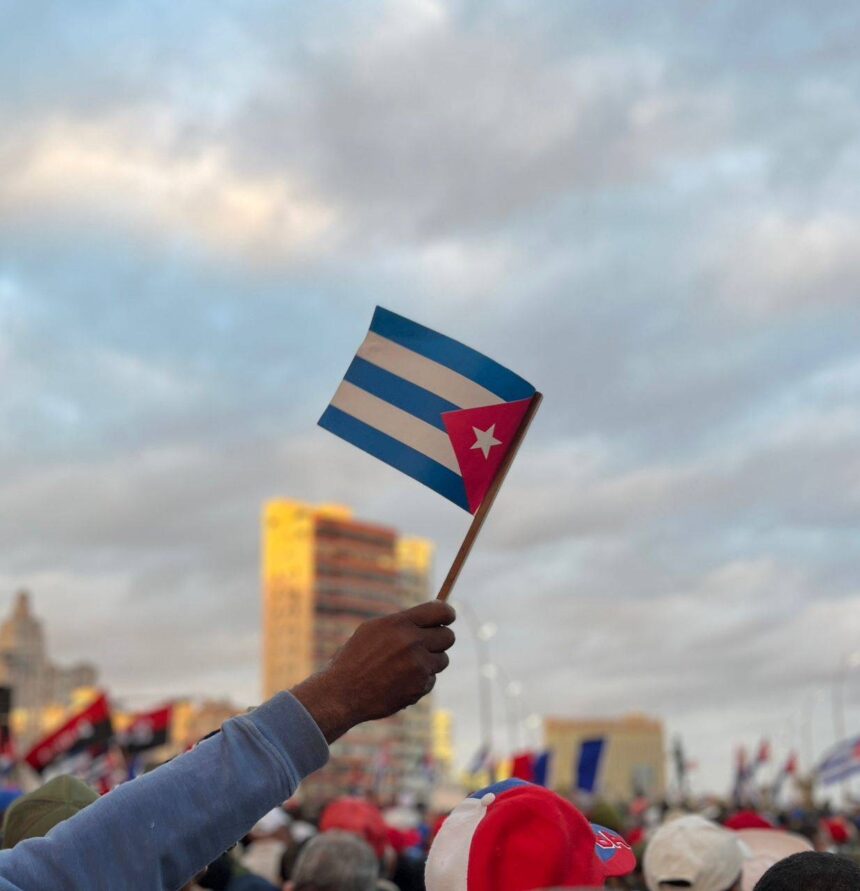Flight records, mercenary testimonies, and satellite imagery reveal a web of covert logistics network making Puntland’s Bosaso into a very crucial node in the UAE’s support for Sudan’s Rapid Support Forces.
Last August, Sudan’s military shot down a cargo aircraft at Nyala Airport, killing more than forty Colombian fighters, Sudanese officials reported. The attack struck the heart of a foreign supply line sustaining their battlefield rival, the Rapid Support Forces (RSF). According to Khartoum, that cargo plane wasn’t just carrying mercenaries. It was a node in an UAE-run airbridge, ferrying fighters and weapons through Bosaso, a coastal city in Somalia’s semi-autonomous northeast region of Puntland.
For months now, the UAE has faced mounting evidence — from flight logs to on-the-ground testimonies — that its Bosaso military base, officially described as a maritime training site, is being used as a staging ground for operations abroad. One of its roles is supporting the RSF’s war against the Sudanese Armed Forces (SAF). Multiple investigations by several outlets all point to a logistics network that is now neither entirely secret nor plausibly deniable.
A Base Repurposed: Bosaso’s Sudden Shift
The UAE’s foothold in Bosaso dates back to its entry into Puntland’s port infrastructure more than a decade ago, at the height of a period notorious for piracy. As per satellite imagery and local news reports, the UAE-run Bosaso naval facility now serves a different purpose. Hiraan Online found that the naval base, initially promoted as a maritime training hub, is effectively an Emirati-only zone featuring new airstrip infrastructure and radar systems — including what analysts believe to be an Israeli-made ELM-2084 radar, allegedly installed with secret authorization from Puntland’s president.
A near-constant fleet of large cargo aircraft have also been photographed on Bosaso’s airport apron in recent months, far exceeding local civilian aviation needs. Several Puntland insiders describe the facility as “fully Emirati-controlled with minimal Somali oversight,” operating under arrangements brokered directly between Abu Dhabi and Puntland authorities — bypassing Mogadishu’s federal government, the internationally recognized government of Somalia.
The resulting ambiguity — Puntland’s semi-autonomy, the UAE large-scale investment, and the absence of the central government’s oversight — have created an ideal jurisdictional loophole for a covert logistics operation of this magnitude to run without the slightest scrutiny.
Mercenary Testimonies: “We Passed Through Bosaso”
The strongest evidence of Bosaso’s role comes from the people who have moved through it.
In a joint investigation by The Guardian and Colombian outlet La Silla Vacía, a Colombian mercenary identified only as “Carlos” described being recruited from the Colombian capital of Bogotá, flown to the UAE, then transited back to Ethiopia before finally arriving at Bosaso on an Ethiopian Airlines flight — a route that sees daily flights. The Addis Ababa-Bosaso route has been noted to be used mainly by Colombians in recent months.
In Bosaso, “Carlos” and dozens of others were assembled for onward deployment to Sudan. His account matches travel itineraries found in Sudan’s submission to the UN. “We stayed in Bosaso for days, then boarded another flight to Nyala,” he said, adding that his first task in Darfur was to train Sudanese child soldiers in small weapons use.
Dozens of other Colombians gave similar accounts to Le Monde and The Africa Report, describing recruitment by UAE-linked private security firms under false pretences. Many believed they were signing contracts for infrastructure security work in the Gulf — only to find themselves armed and deployed under the RSF banner.
Sudan’s intelligence services allege that between late 2024 and early 2025, over 350 Colombian fighters were ferried to Sudan via Bosaso in what they call the “Desert Wolves” programme — a UAE-financed foreign legion designed to tilt the balance of the war in favor of the RSF.
Flight Records and Satellite Data: Detailing the Airbridge
In September 2025, Sudan submitted a detailed complaint to the UN Security Council, accusing the UAE of recruiting, financing, and transporting mercenaries via Somali and Libyan airfields. The UN record of the session quotes Sudan’s delegate alleging “a systematic campaign to flood the battlefield with foreign fighters” after RSF setbacks in recent months.
The Sudanese dossier, shared with Financial Times reporters, included 248 flight records from November 2024 to February 2025. These logs largely document chartered aircraft routing fighters and equipment from the territory of the UAE to Bosaso, then on to airfields in Darfur. Some manifests list transported cargo as “construction material” or “humanitarian aid” — but are accompanied by Colombian passport scans and combat manuals. The FT report described the documents as “detailed and internally consistent.”
Independent satellite analysts have observed heavy-lift cargo planes and drones at Nyala Airport, consistent with long-range supply flights. Publicly available flight tracking apps do not cover most military charters, but commercial satellite imagery shows repeated patterns of aircraft arrivals from the Horn of Africa in the said months cited by the Sudanese government report.
Sudan Turns to Mogadishu for Help
In late August 2025, Sudan’s intelligence chief, Lt. Gen. Ahmed Ibrahim Ali Mufaddal, arrived in Mogadishu with a letter for President Hassan Sheikh Mohamud. According to the Somali Guardian, the letter demanded that Somalia “halt the use of its territory, particularly Bosaso, for foreign mercenary and arms transfers.” Mufaddal reportedly briefed Somali security officials on the Bosaso operation before returning to Khartoum.
The day after, a UAE ministerial delegation landed in Mogadishu, allegedly to “reassure” Somali leaders and prevent alignment with Sudan’s position. Puntland authorities publicly dismissed Sudan’s allegations as “baseless,” while the federal government surprisingly remained silent. Somalia’s fragmented and fractured political structure — where Puntland often acts independently — has allowed UAE operations to continue.
At the UN, Sudan formally invoked multiple international instruments, including the 1989 International Convention against the Recruitment, Use, Financing and Training of Mercenaries, accusing the UAE of “gross violations of international law.” The UAE’s foreign ministry categorically denied the allegations, calling them “disinformation.”
A Pattern of Plausible Deniability
The UAE’s alleged use of Bosaso mirrors tactics seen elsewhere: outsourcing warfare through private contractors, shell companies and now pliant local authorities. In late 2024, the United Nations revealed that Emirati supply flights were flooding a remote airstrip in Chad, allegedly ferrying weapons to RSF fighters under humanitarian cover. The Bosaso corridor fits this pattern.
The Airbridge’s Human Cost
On the battered and contested Sudanese territory, this logistical network has ongoing brutal consequences. As Colombian mercenaries train Sudanese teenagers in the use of small arms to swell the ranks of RSF infantrymen, the group appear to have been emboldened by this newfound foreign expertise. The RSF have also intensified their sieges of El Fasher and Nyala, contributing to more atrocities and mass displacement. Sudan’s war has already killed more than 150,000 people and displaced over 13 million since April 2023.
The RSF with their UAE backing have inflicted unspeakable horror on Sudan, waging a campaign of terror marked by mass killings, the burning of villages, systematic rape and the deliberate starvation of civilians. These atrocities have broken up families and erased entire communities, plunging the country into one of the worst humanitarian crises in modern history.
Behind this carnage stands the United Arab Emirates, whose financial and logistical lifeline keeps the RSF’s war machine alive — arming them, funding their rampage and sustaining foreign mercenaries who trade in Sudanese blood. The suffering of millions in Sudan continues not just because of the RSF’s insane brutality, but because of such a foreign patron who bankrolls their crimes without care. Every such flight that lands in from Bosaso further feeds this brutal war machine.





